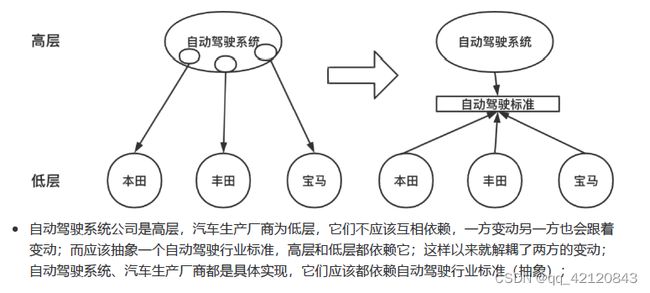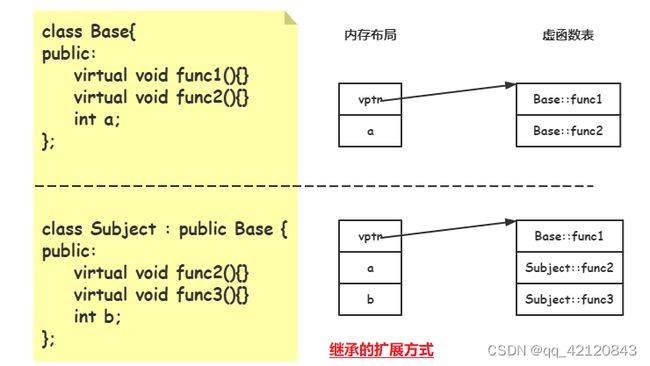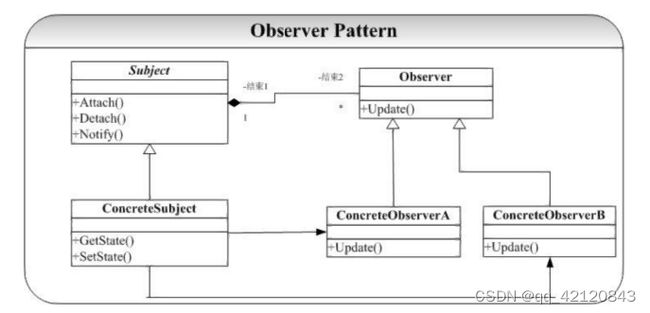创建型设计模式学习笔记
简述
-
设计模式是指在软件开发中,经过验证的,用于解决在特定环境下重复出现的、特定问题的解决方案。
-
有创建型和结构型设计模式
-
怎么学习设计模式
- 找稳定点和变化点,把变化点隔离出来,也就是解耦合(注意不是消除耦合)
- 先满足设计原则,慢慢迭代出设计模式
-
耦合表示两个子系统(或类)之间的关联程度
-
编程在于抽象和分治思维。
设计原则
依赖倒置
- 高层模块不应该依赖于底层模块,两者都应该依赖抽象
- 抽象不应该依赖具体实现,具体实现应该依赖于抽象。(这话是真抽象~~)
开放封闭
- 一个类应该对扩展(组合与继承开放),对修改关闭。
面向接口
- 不将变量类型声明为某个特定的具体类,而是声明为某个接口。
- 客户程序无需获知对象的具体类型,只需要知道对象所具有的接口。
- 减少系统中各部分的依赖关系,从而实现高内聚、松耦合的类型设计方案。
封装变化点
- 将稳定点和变化点分离,扩展修改变化点;让稳定点和变化点的实现层次分离。
单一职责
- 一个类应该仅有一个引起它变化的原因。
里氏替换
- 子类型必须能够替换掉它的父类型;主要出现在子类覆盖父类实现,原来使用父类型的程序可能出现错误;覆盖了父类方法却没有实现父类方法的职责。
接口隔离
- 不应该强迫客户依赖于它们不用的方法;
- 一般用于处理一个类拥有比较多的接口,而这些接口涉及到很多职责
组合优于继承
- 继承耦合度高,组合耦合度低
模板方法
定义:
定义一个操作中的算法的骨架 ,而将一些步骤延迟到子类中。 Template Method使得子类可以不
改变一个算法的结构即可重定义该算法的某些特定步骤。
例子
某个品牌动物园,有一套固定的表演流程(稳定点),但是其中有若干个表演子流程(变化点)可创新替换,以尝试迭代更新表演流程;
有缺陷的代码:
#if 0
class ZooShow {
public:
void Show0() {
cout << "show0" << endl;
}
void Show2() {
cout << "show2" << endl;
}
};
class ZooShowEx {
public:
void Show1() {
cout << "show1" << endl;
}
void Show3() {
cout << "show3" << endl;
}
};
// 不满足单一职责 , 开放扩展封闭修改 原则
// 动物园固定流程,迭代创新
// 稳定和变化 一定的方向上变化
#else if 2
class ZooShow {
public:
ZooShow(int type = 1) : _type(type) {}
public:
void Show() {
if (Show0())
PlayGame(); // 里氏替换
Show1();
Show2();
Show3();
}
// 接口隔离 不要让用户去选择它们不需要的接口
private:
void PlayGame() {
cout << "after Show0, then play game" << endl;
}
private:
bool Show0() {
cout << _type << " show0" << endl;
return true;
}
void Show1() {
if (_type == 1) {
cout << _type << " Show1" << endl;
} else if (_type == 2) {
cout << _type << " Show1" << endl;
} else if (_type == 3) {
}
}
void Show2() {
if (_type == 20) {
}
cout << "base Show2" << endl;
}
void Show3() {
if (_type == 1) {
cout << _type << " Show1" << endl;
} else if (_type == 2) {
cout << _type << " Show1" << endl;
}
}
private:
int _type;
};
#endif
int main () {
#if 0
ZooShow *zs = new ZooShow;
ZooShowEx *zs1 = new ZooShowEx;
zs->Show0();
zs1->Show1();
zs->Show2();
zs1->Show3();
#else if 2
ZooShow *zs = new ZooShow(1);
zs->Show();
#endif
return 0;
}
优化后的代码
class ZooShow {
public:
void Show() {
if (Show0())
PlayGame();
Show1();
Show2();
Show3();
}
private:
void PlayGame() {
cout << "after Show0, then play game" << endl;
}
protected:
virtual bool Show0(){
cout << "show0" << endl;
return true;
}
virtual void Show2(){
cout << "show2" << endl;
}
virtual void Show1() {
}
virtual void Show3() {
}
};
//重写父类的方法
class ZooShowEx1 : public ZooShow {
protected:
virtual bool Show0(){
cout << "show1" << endl;
return true;
}
virtual void Show2(){
cout << "show3" << endl;
}
};
class ZooShowEx2 : public ZooShow {
protected:
virtual void Show1(){
cout << "show1" << endl;
}
virtual void Show2(){
cout << "show3" << endl;
}
};
class ZooShowEx3 : public ZooShow {
protected:
virtual void Show1(){
cout << "show1" << endl;
}
virtual void Show3(){
cout << "show3" << endl;
}
virtual void Show4() {
//
}
};
/*
*/
int main () {
ZooShow *zs = new ZooShowEx3;
// ZooShow *zs1 = new ZooShowEx1;
// ZooShow *zs2 = new ZooShowEx2;
zs->Show();
return 0;
}
要点
- 常用的设计模式,子类可以复写父类子流程,使父类的骨架流程丰富;
- 反向控制流程的典型应用;
- 模板方法是最能体现设计模式的精髓,使用频率最高。
- 父类protected保护子类需要复写的子流程,这样子类的子流程只能父类调用
本质
通过固定算法骨架来约束子类的行为。
注解:
-
单一职责、里氏替换、接口隔离都是来佐证开闭原则
里氏替换:开放扩展,继承父类的职责单一职责:对修改封闭
接口隔离:对修改封闭
观察者模式
定义:
定义对象间的一种一对多(变化)的依赖关系,以便一个对象(subject)的状态发生改变时,所有依赖于它的对象都能得到通知并自动更新
例子:
气象站发布气象资料给数据中心,数据中心经过处理,将气象信息更新到两个不同的显示终端(A和B);
即数据中心接收到数据(信号),就要进行处理并发送给所有终端(槽函数)
满足观察者模式的demo
class IDisplay {
public:
virtual void Show(float temperature) = 0;
virtual ~IDisplay() {}
};
class DisplayA : public IDisplay {
public:
virtual void Show(float temperature);
private:
void jianyi();
};
class DisplayB : public IDisplay{
public:
virtual void Show(float temperature);
};
class DisplayC : public IDisplay{
public:
virtual void Show(float temperature);
};
class WeatherData {
};
class DataCenter {
public:
void Attach(IDisplay * ob);
void Detach(IDisplay * ob);
void Notify() {
float temper = CalcTemperature();
for (auto iter = obs.begin(); iter != obs.end(); iter++) {
(*iter)->Show(temper);
}
}
// 接口隔离
private:
virtual WeatherData * GetWeatherData();
virtual float CalcTemperature() {
WeatherData * data = GetWeatherData();
// ...
float temper/* = */;
return temper;
}
//存放订阅者(观察者)
std::vector<IDisplay*> obs;
};
int main() {
DataCenter *center = new DataCenter;
IDisplay *da = new DisplayA();
IDisplay *db = new DisplayB();
IDisplay *dc = new DisplayC();
//"订阅"
center->Attach(da);
center->Attach(db);
center->Attach(dc);
//"发布"
center->Notify();
//-----
center->Detach(db);
center->Notify();
return 0;
}
要点
- 观察者模式使得我们可以独立地改变目标与观察者,从而使二者之间的关系松耦合
- 观察者自己决定是否订阅通知,目标对象并不关注谁订阅了。
- 观察者不要依赖通知顺序,目标对象也不知道通知顺序
- 常用在基于事件的ui框架中,也是MVC的组成部分;
- 常用在分布式系统中、actor框架中。
观察者模式还用在:zk、etcd、kafka、redis、分布式锁、
公平锁(互斥锁、会阻塞导致线程切换)、
非公平锁(自旋锁)
队列操作:用自旋锁
重io操作(磁盘操作、关闭大文件):用互斥锁
锁粒度: 操作临界资源的时长
本质:触发联动
结构图
心得
- 学了信号槽、以及C语言中信号注册回调函数知识,使得这里观察者模式的理解柳暗花明。
策略模式
定义
定义一系列算法,把它们一个个封装起来,并使它们可以相互替换。该模式使得算法可独立于使用它的客户程序而变化。
背景
某商场节假日有固定促销活动,为了加大销售力度,现提升国庆节促销活动规格。
未使用策略模式的代码
enum VacationEnum {
VAC_Spring,
VAC_QiXi,
VAC_Wuyi,
VAC_GuoQing,
VAC_ShengDan,
};
class Promotion {
VacationEnum vac;
public:
double CalcPromotion(){
if (vac == VAC_Spring) {
// 春节
}
else if (vac == VAC_QiXi) {
// 七夕
}
else if (vac == VAC_Wuyi) {
// 五一
}
else if (vac == VAC_GuoQing) {
// 国庆
}
else if (vac == VAC_ShengDan) {
}
}
};
如果一个 只有稳定点 不需要设计模式
如果 全是变化点 怎么办? 如 c++ 游戏开发 ,则使用脚本语言
采用策略模式的代码
class Context {
};
class ProStategy {
public:
virtual double CalcPro(const Context &ctx) = 0;
//抽象基类的析构必须是虚析构,
//使得调用的析构函数是子类自己的析构
//防止内存泄漏
virtual ~ProStategy();
};
// cpp
class VAC_Spring : public ProStategy {
public:
virtual double CalcPro(const Context &ctx){}
};
// cpp
class VAC_QiXi : public ProStategy {
public:
virtual double CalcPro(const Context &ctx){}
};
class VAC_QiXi1 : public VAC_QiXi {
public:
virtual double CalcPro(const Context &ctx){}
};
// cpp
class VAC_Wuyi : public ProStategy {
public:
virtual double CalcPro(const Context &ctx){}
};
// cpp
class VAC_GuoQing : public ProStategy {
public:
virtual double CalcPro(const Context &ctx){}
};
class VAC_Shengdan : public ProStategy {
public:
virtual double CalcPro(const Context &ctx){}
};
class Promotion {
public:
Promotion(ProStategy *sss) : s(sss){}
~Promotion(){}
double CalcPromotion(const Context &ctx){
return s->CalcPro(ctx);
}
private:
ProStategy *s;
};
int main () {
Context ctx;
ProStategy *s = new VAC_QiXi1();
Promotion *p = new Promotion(s);
p->CalcPromotion(ctx);
return 0;
}
在时间判断中,时间if else 判断是否是某个节日----稳定点
根据节日,使用if else选择某个促销规格----变化点
要点
- 策略模式提供了一系列可重用的算法,从而使得类型在运行时方便地根据需要在各个算法之间切换。
- 策略模式消除了条件判断语句;也就是在解耦合。
本质
- 分离算法,选择实现




